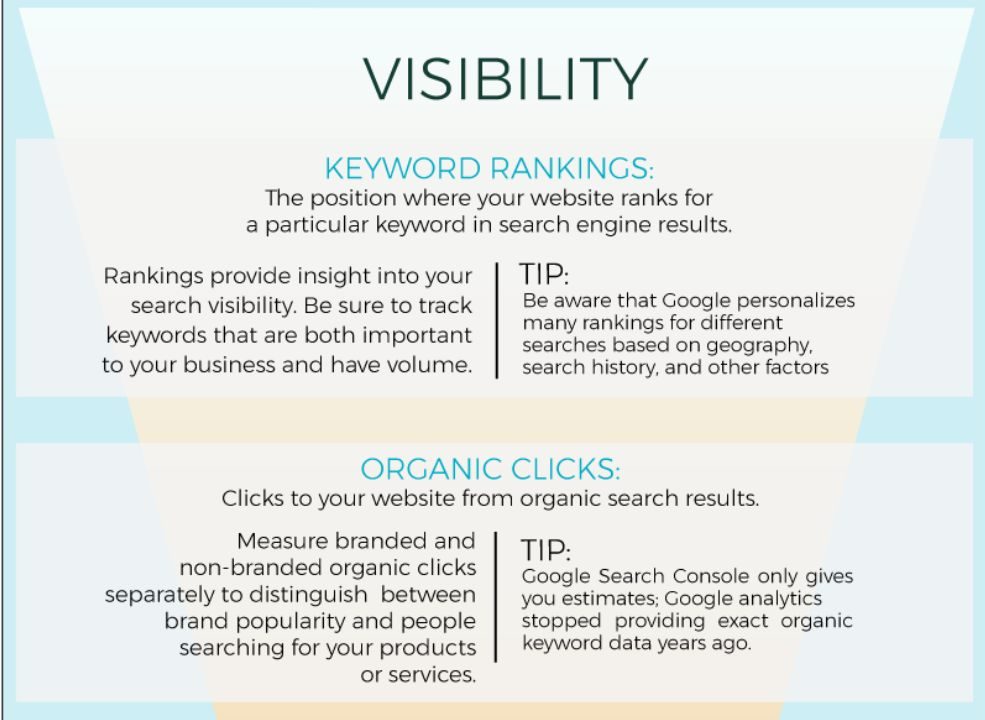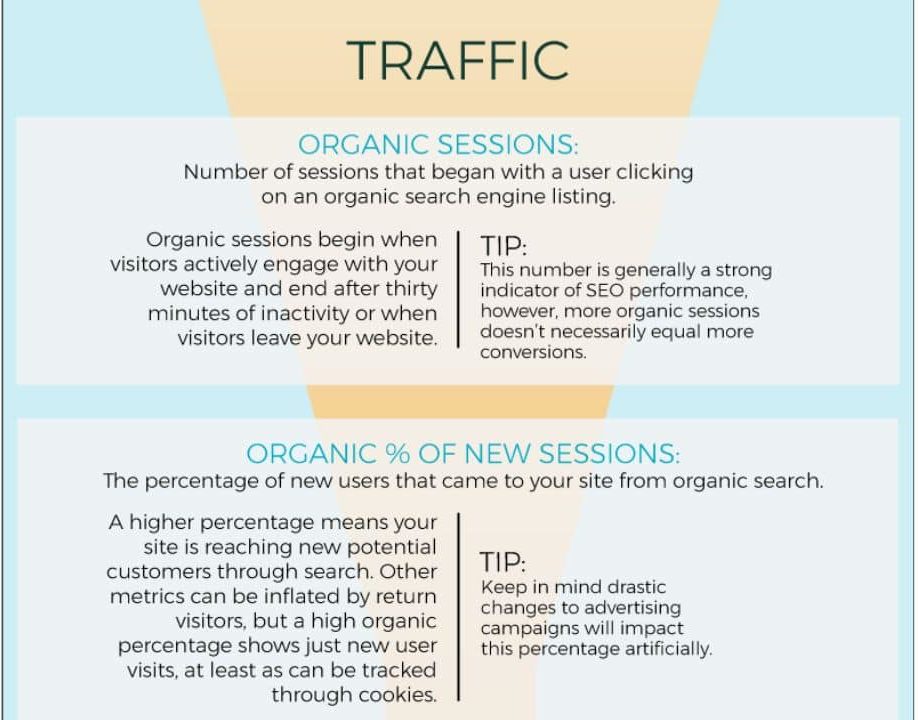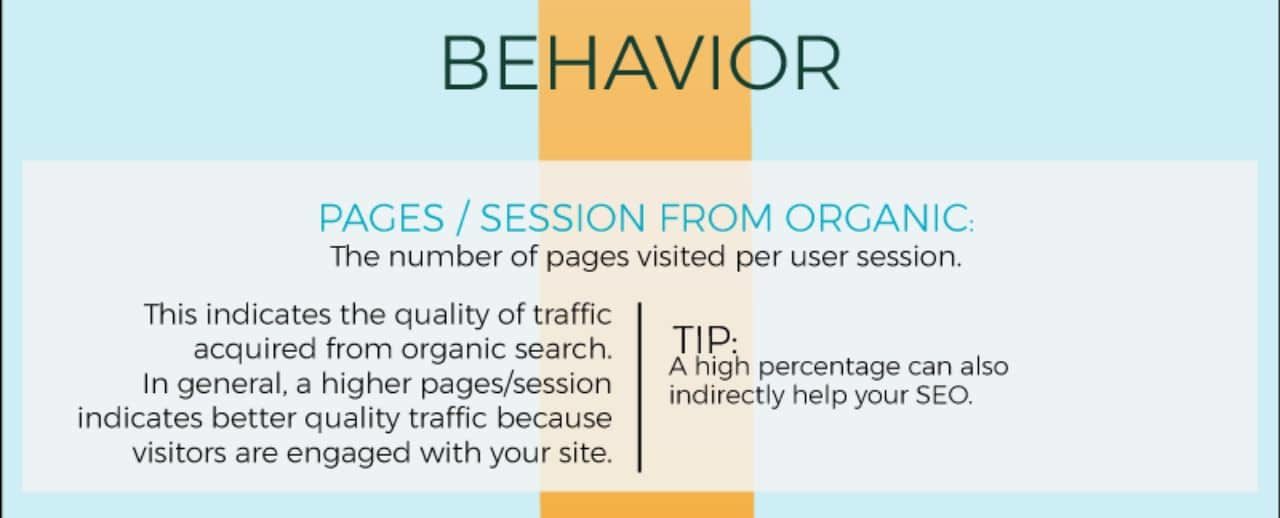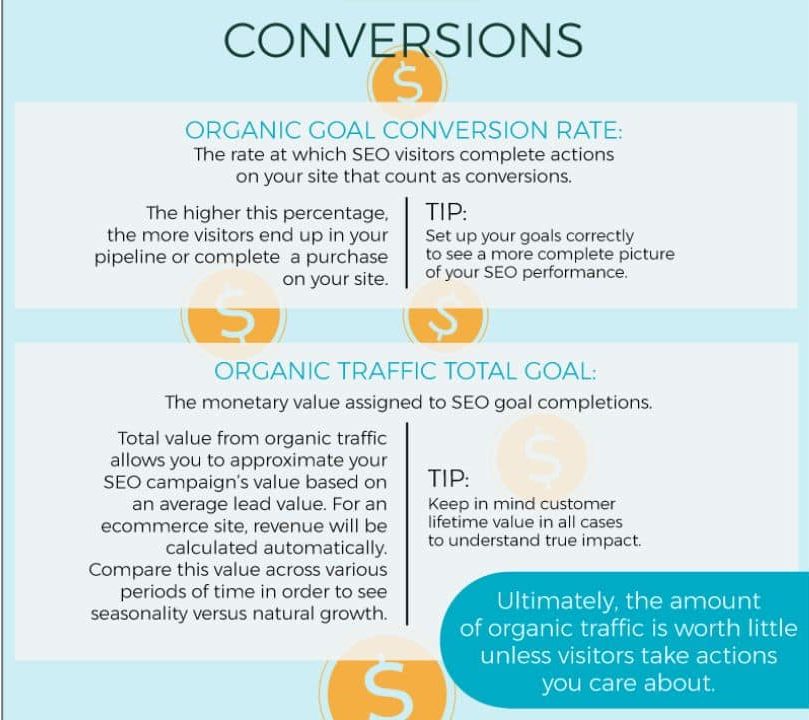Interpreting search engine optimization (SEO) stats and how they impact your business shouldn’t be as tiresome as it is. That’s why we came up with this SEO cheat sheet to be your guide for understanding common organic search performance metrics.
View and share the image below or download the guide now.
Share this Image On Your Site
The CMO’s SEO Cheat Sheet For Understanding Search Performance
Website performance can be measured in thousands of ways, making it difficult to judge the impact of your SEO efforts. Quit feeling overwhelmed and focus on the following 7 metrics.
What does “organic” have to do with online marketing? Digital marketers associate the word “organic” with SEO to distinguish it from paid ads.
SEO Cheat Sheet Topic #1: Visibility
Keyword Rankings:
The position where your website ranks for a particular keyword in search engine results. Rankings provide insight into your search visibility. Be sure to track keywords that are both important to your business and have volume.
Tip: Be aware that Google personalizes many rankings for different searches based on geography, search history, and other ranking factors.
Organic Clicks:
Clicks to your website from organic search results. Measure branded and non-branded organic clicks separately to distinguish between brand popularity and people searching for your products or services.
Tip: Google Search Console only gives you estimates. Google Analytics stopped providing exact organic keyword data years ago.
SEO Cheat Sheet Topic #2: Traffic
Organic Sessions:
Number of sessions that began with a user clicking on an organic search engine listing. Organic sessions begin when visitors actively engage with your website and end after thirty minutes of inactivity or when visitors leave your website.
Tip: This number is generally a strong indicator of SEO performance. However, more organic sessions doesn’t necessarily equal more conversions.
Organic % Of New Sessions:
The percentage of new users visiting your site from organic search. A higher percentage means your site is reaching new potential customers through search. Other metrics can be inflated by return visitors, but a high organic percentage shows just new user visits, at least as it can be tracked through cookies.
Tip: Keep in mind drastic changes to advertising campaigns will impact this percentage artificially.
SEO Cheat Sheet Topic #3: Behavior
Pages / Session From Organic
The number of pages visited per user session. This indicates the quality of traffic acquired from organic search. In general, a higher pages/session indicates better quality traffic because visitors are engaged with your site.
Tip: A high percentage can also indirectly help your SEO.
CMO Cheat Sheet Topic #4: Conversions
Organic Goal Conversion Rate:
The rate at which SEO visitors complete actions on your site that count as conversions. The higher this percentage, the more visitors end up in your pipeline or complete a purchase on your site.
Tip: Set up your goals correctly to see a more complete picture of your SEO performance.
Organic Traffic Total Goal:
The monetary value assigned to SEO goal completions. Total value from organic traffic allows you to approximate your SEO campaign’s value based on an average lead value. For an eCommerce site, revenue will calculated automatically. Compare this value across various periods of time in order to see seasonality versus natural growth.
Tip: Keep in mind customer lifetime value in all cases to understand true impact.
Ultimately, the amount of organic traffic is worth little unless visitors take actions you care about.
For CMOs, SEO Results Are Prioritized Differently
Sure, there’s always going to be shared goals and common ground between colleagues at a growing organization. That being said, there are a lot of search engine optimization (SEO) metrics that a CMO shouldn’t have to be directly concerned about. For instance, when’s the last time you heard you checked in on the performance of these common “SEO metrics”:
- Domain authority
- Percentage of duplicate content
- Title tags greater than 60 characters
- Meta descriptions longer than 160 characters
- Amount of target keyword usage
While addressing these items are important to an successful SEO strategy, they really have no importance to a marketing leader. Instead, marketing leadership’s primary focus is on how to measure SEO performance against the greater business goals…
- How is SEO contributing to our lead volume?
- How is SEO contributing to our sales and revenue goals?
- How is traffic from SEO improving our ability to charge advertisers at a higher rate?
For more helpful resources from our team to help better understand SEO and digital marketing, please check out:
- The CMO’s PPC Score Card
- The Proactive SEO Site Migration Checklist
- The Digital Marketing Crisis Response Guide
- What Does Working With A Google Partner Agency Mean For You?
Looking for a SEO cheat sheet you can share with your web developer? Try this one from Moz.








